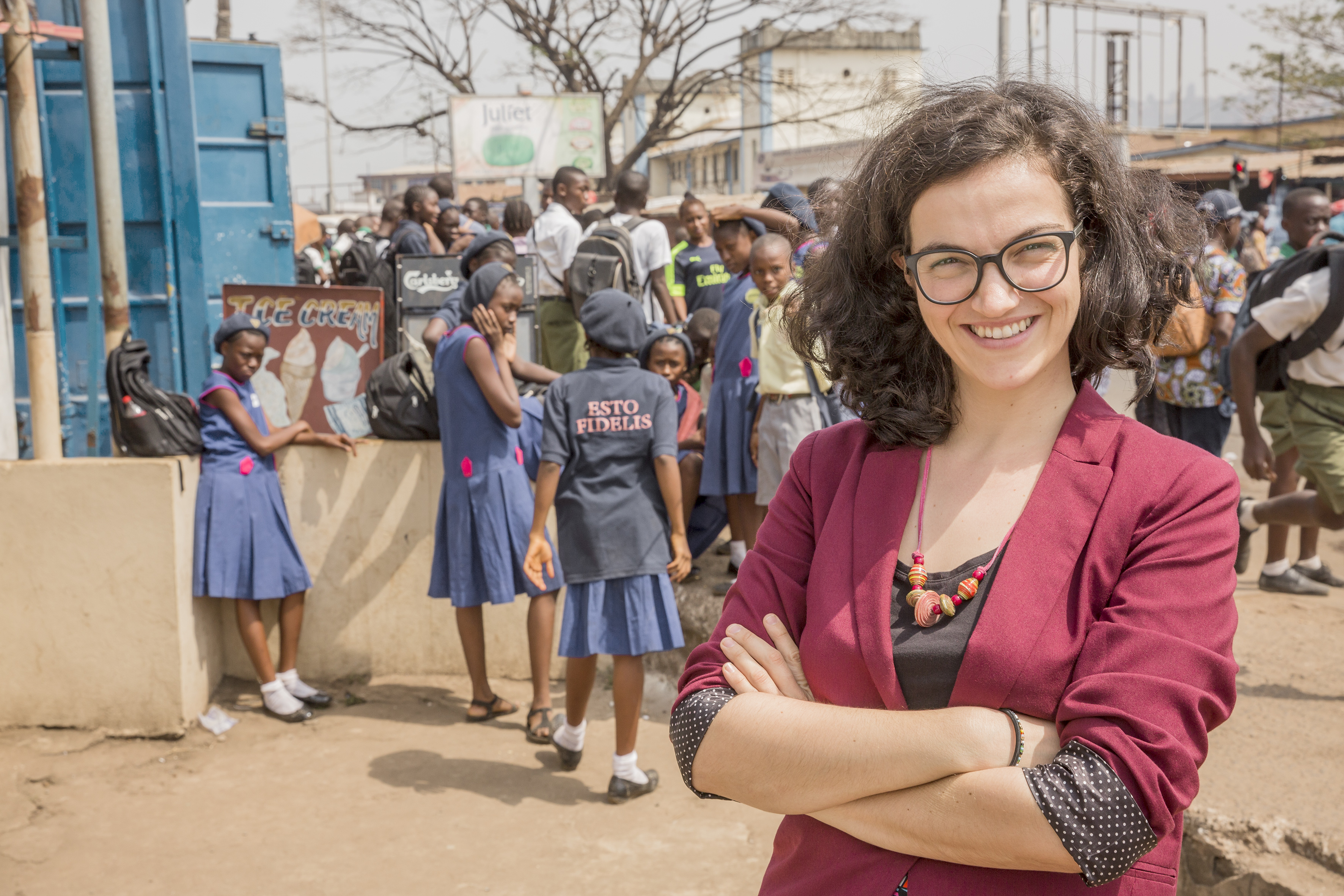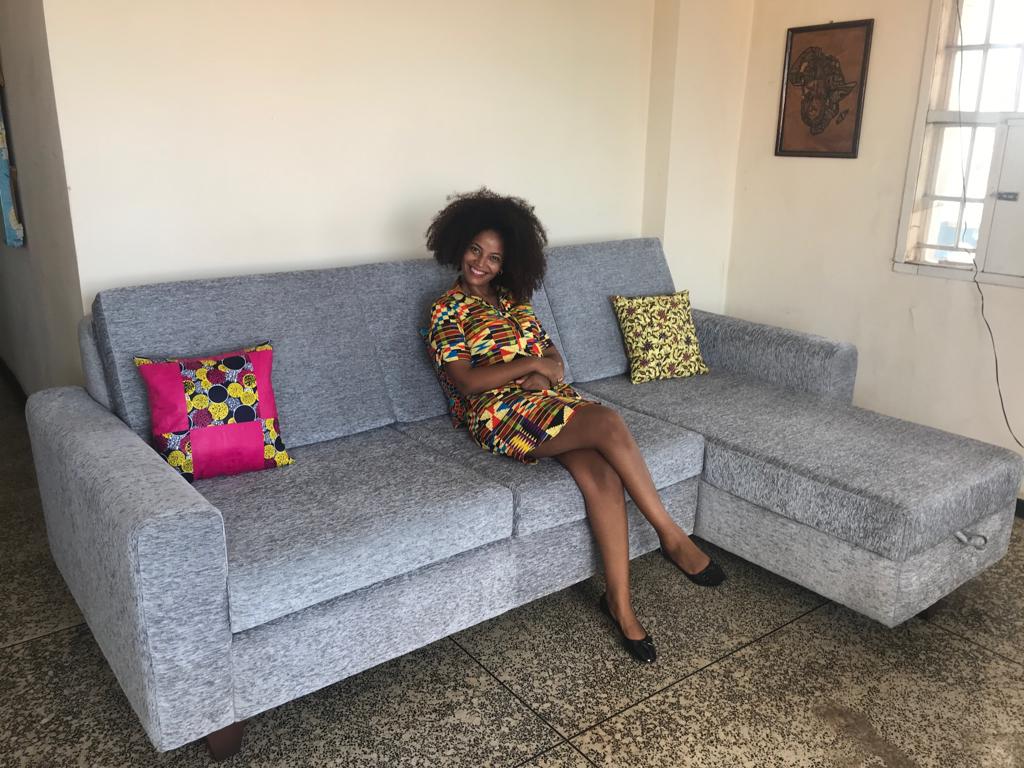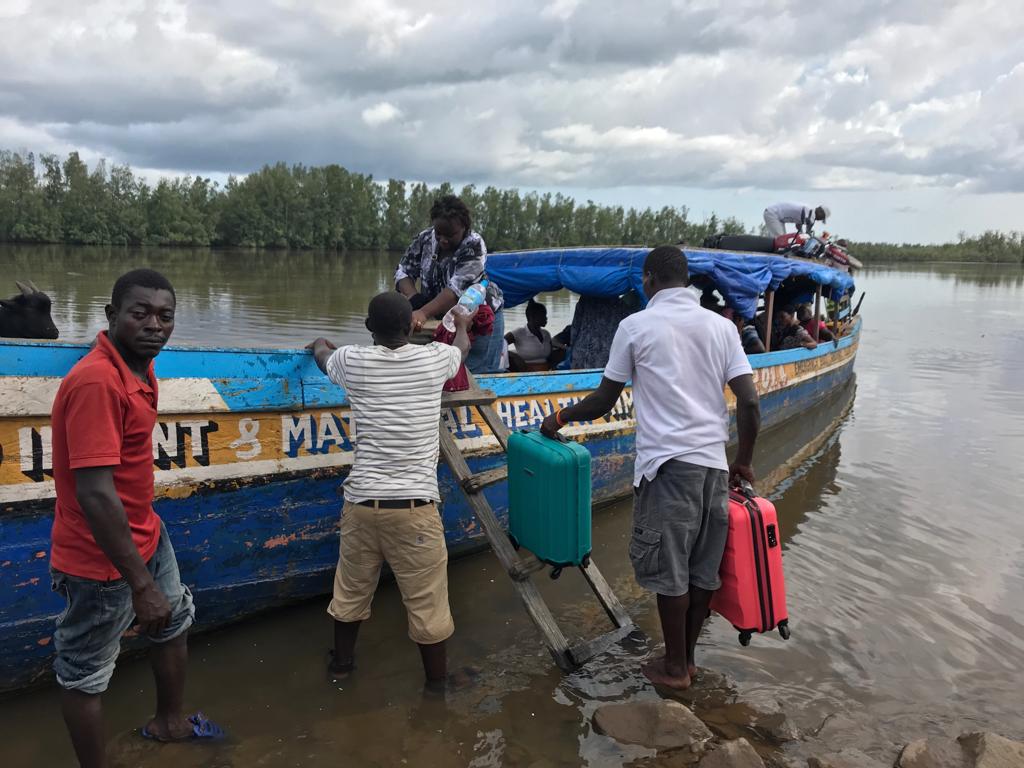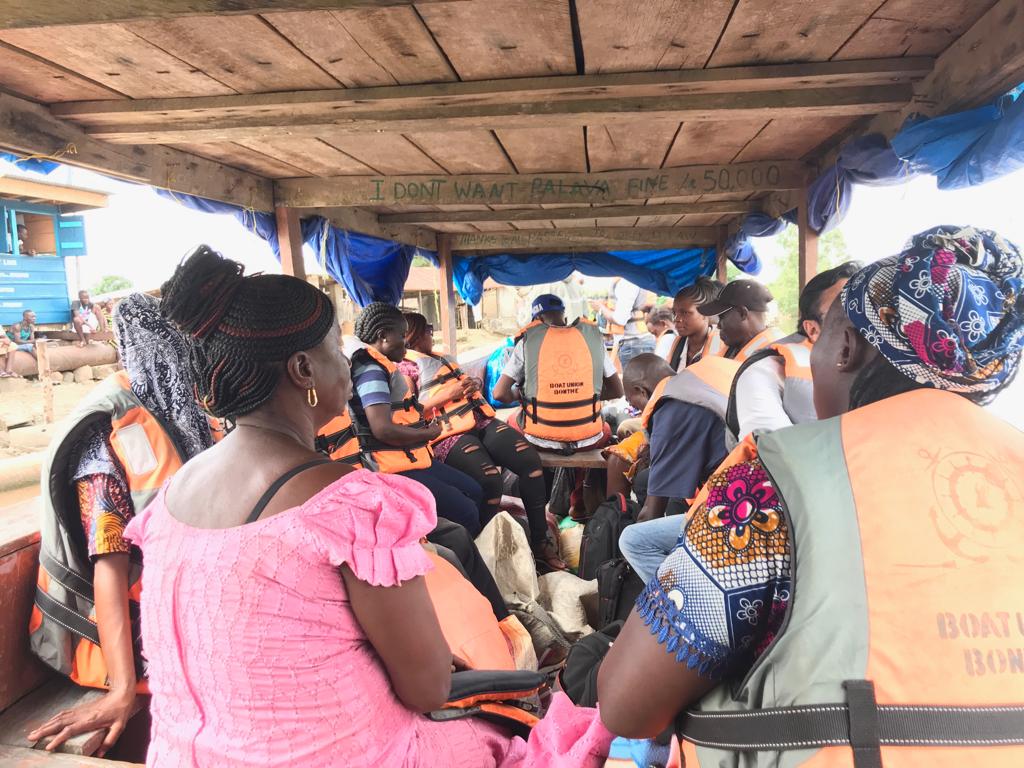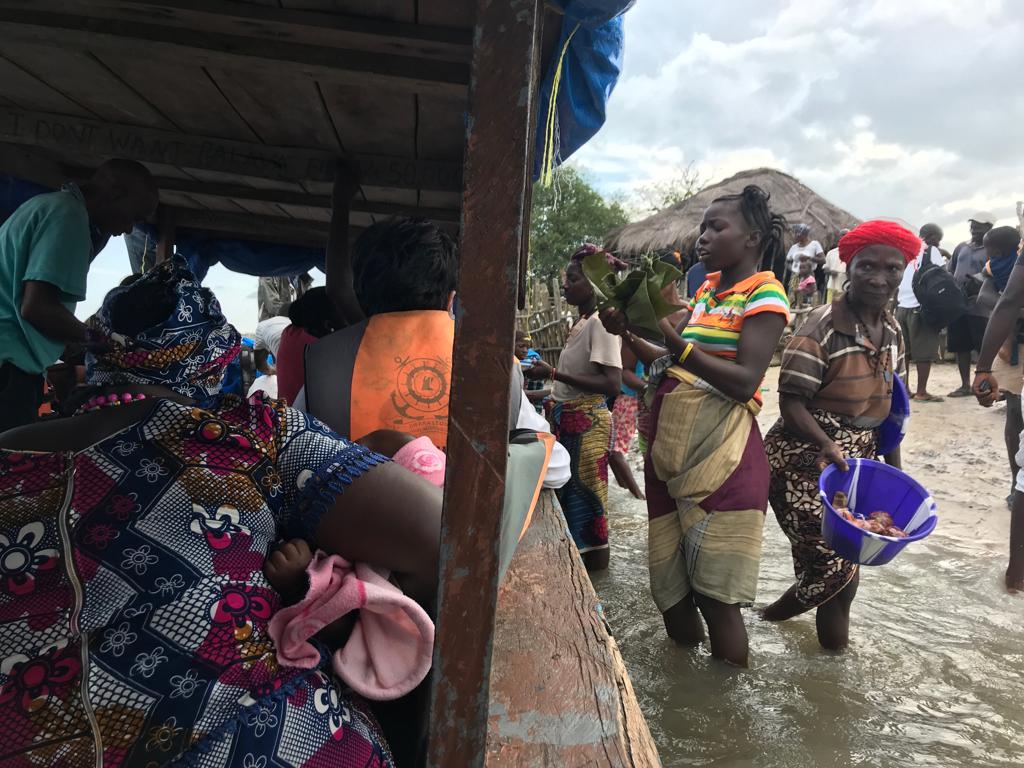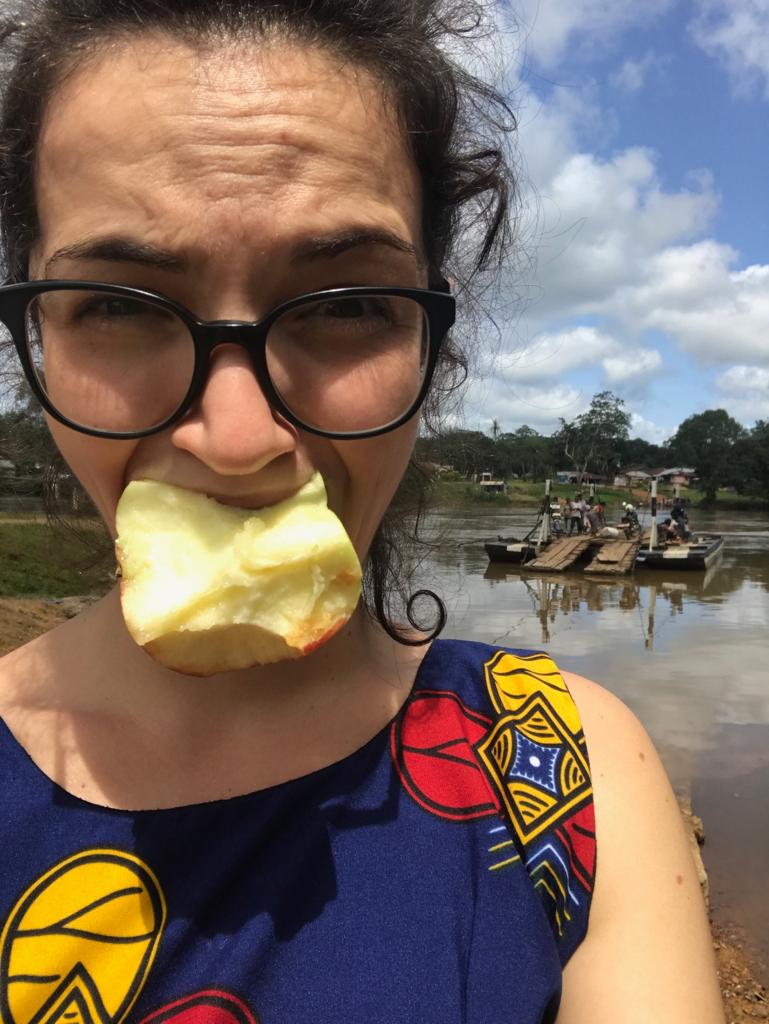WIR HABEN EINE NEUE HOMEPAGE:
http://www.ciaverein.com
Wunderschön, mit allen relevanten Informationen zur Schule, multifunktionell – schau sie Dir an!
HOW DID IT ALL START?
The Community Initiative Academy (CIA) was started in 2010 by the people of Nyandeyama, Kenema District, Sierra Leone, because there was no junior secondary school (JSS; comparable to Sekundarschule in Switzerland) in the town with more than 40,000 inhabitants. Pupils had to go to nearby Kenema (200,000 inhabitants), that had three secondary schools – also by far not enough to satisfy demand. Starting with 50 pupils in 2010, five years later the school had grown to 120 pupils but was struggling with finishing the school building with three classrooms, and paying the teachers. The Government of Sierra Leone had approved the school for assistance, but the ‘assistance’ had been limited to payment of one teacher. The infrastructural needs, the land, the other teachers, the books and uniforms were paid through a combination of community contributions (mostly in kind), the village chief’s contribution from his own pockets and small school fees levied on the pupils (25,000 per term, USD 2.70, or about USD 8 for a whole year of schooling).
In 2015, a proposal to collaborate landed on the desk of Noemi Schramm, who had by then spent nearly two years in Sierra Leone and was supporting different projects on an adhoc basis. She was employed by the Ministry of Health and Sanitation and was working as health economist on various projects to increase access and affordability of health services to the wide populace. However, one of the recurring key problems in her work stemmed from the lack of quality education – how are people supposed to know what to expect from a hospital, what an acceptable amount to pay for treatment is, or what basic prevention could help prevent Malaria? In a country with the world’s highest maternal mortality rate, and one of the worst child mortality rates,[1] interventions to drive those rates down needed to come from all sectors. The research is clear – if you want to save a child’s life, educate the mother[2].
The educational system in Sierra Leone was still rebuilding its infrastructure and human capital, after a decade of civil war, that destroyed a lot of the schools, and led to a generation missing out on education. While there was good progress being made in primary school enrolment, secondary schooling remained expensive and often simply not available[3]. Furthermore, the general outcomes of schooling were embarrassing for a country that used to be called ‘the Athens of West Africa’ for its high standard educational system, up until the 1970s, when it rapidly started declining. The literacy rates are still incredibly low, leaving more than half of the women and 4 out of 10 men not able to read or write a full sentence.[4] There was and still is a big case for investments in education – something that the recently newly elected government had recognized and therefore launched the Free Quality Education initiative, paying school fees and examination fees and school books for all government schools, encouraging partners to also prioritize investments in education.
Back in the office of the Health Financing Unit in Youyi Building, Freetown, Noemi was working on initiatives to provide cash to all 1300 public health facilities nationwide and evaluating the outcomes of the cash transfers. The outcomes clearly showed that solving locally identified problems had a much wider impact than a centrally imposed project. It was obvious – the communities and facility staff knew best what they needed to further improve service delivery. As soon as they were given the money, solutions were implemented cheaper and faster than a centrally led project ever could. It was these kind of experiences that shaped her belief that the most effective and efficient way to support communities is to identify strong, trusted leaders of those communities, and entrust them with the cash necessary to implement their home-grown projects. No NGO, no UN agency, and no government agency can identify, plan and implement projects better, faster and more cost-effective than an invested community with good leadership.
The letter for support to the Community Initiative Academy (CIA) was written by the board of the school, consisting of community members, and signed by the wife of the local chief, Madam Margaret Suwu. She is recognized in her community as a champion for women’s and girl’s advancement, and serves as a role model. She spent her time, resources and energy on building the school, and keeping it running. In 2015, it came to a meeting in Nyandeyama, five hours from Freetown, where it was agreed that Noemi, with support of her family and friends in Switzerland, would support the finishing of the three classrooms that the community had started constructing, as well as paying stipends to teachers, to serve as a part of the salary. Noemi and Margaret did not like the approach of sponsoring individual pupils, as this often overlooks the broader issues of lacking infrastructure, or lacking incentives for teachers to actually show up for their lessons. By paying a teacher’s salary, that teacher was able to teach several hundred pupils, having a much wider impact than sponsoring a single pupil alone. In short, we were paying teachers to teach a whole village.
…AND HOW DOES IT WORK?
The support was agreed to be time-limited, to incentivise the school to establish itself and provide schooling options to the thousands of primary school finishers, while working on getting more support from government. Having been approved as a government assisted school meant that the central and district government should provide teacher salaries, as well as books and learning materials. However, due to bureaucracy and political and ethnic differences, it can take several years (up to ten years) to enjoy the full assistance of government. The support of the Swiss friends should ensure that pupils can undergo secondary school in the meantime, and also help build a base of future supporters of the school (alumni who went to further education and then give back).
Inspired by Noemi’s lectures at the University of Zurich on behavioural economics, and recognizing the importance of setting the right incentive rewarding mechanisms, a performance bonus was instituted as part of the support. If the school would rank in the top three of the annual exams conducted nationwide at the end of junior secondary school, every teacher and the school in general would receive a bonus. The teachers were also monitored in terms of their punctuality, and monthly stipends are only paid if teachers appear to classes on time – usually a big issue in Sierra Leone.
The same studies and her experience in the health sector also taught Noemi that the most effective way to improve developmental outcomes are cash transfers. Inspired by programs in Mexico and pilots in India, she decided to setup the support with as little involvement of her as possible, leaving the main decision-making in the hands of the community, and applying the same principles of a conditional cash transfer program for households in Mexico to the CIA school in Nyandeyama, Sierra Leone.
A separate bank account was opened for the school, in order to allow for full financial transparency and accountability. Noemi sends the stipends at the end of every month, and the school returns signed sheets for each payment. Once a year, a full financial statement is prepared, and a joint audit of school finances is conducted. In the first four years of the project, there has never been a financial mismatch, and every Leones (the local currency) was invested to maximize its impact.
The general day-to-day running of the school is in the hands of the principal, a well-trained and educated teacher, with experience running schools. He works under supervision of Margaret, the wife of the chief, who is the chairperson of the board. The board, which includes Margaret, village elders, religious leaders and parents’ representatives, governs the overall setup of the school and strategic direction. Noemi’s role is fundraising and setting financial incentives that improve the overall impact of the school. All support and all projects are co-financed, meaning the community has to contribute too. For infrastructural projects, that means the community is providing the land for free, some labor and some materials, while the financial support pays for the rest. For teachers, that means that they are all paid on performance and receive a smaller salary if they do not perform well. Co-financing projects ensures that only projects are implemented that have full community ownership and are a clearly prioritized need. It does slow down the pace of development, but it is a necessary step to ensure sustainability – given that maintenance has to be carried out by the school itself. They should only take on as much as they can handle.
In 2017, an opportunity arose to partner with a secondary school in Effretikon, Switzerland, and create a school partnership. This involves letter friendships between the pupils, who are paired up and exchange letters three times a year. The Swiss pupils raise funds once a year, to support the fitting of a new classroom, or the distribution of pens and notebooks to all before Christmas. The letters serve as a practice in English for both sides, as they are both non-native English speakers, and at a similar language level. It also provides fascinating insights into the lives of children on the other spectrum of the Human Development Index[5], raising the global awareness of how similar we all are, despite income differences. Especially the Swiss pupils have been deeply impressed by the exchange, and both sides are equally joyful when the letters arrive. It has created a human bridge between two countries, just by exchanging words on paper, and highlighting similarities in dreams and hopes for the future.
As part of the school friendship, a teacher during her sabbatical leave came for a month to teach the teachers of CIA school. She lived on campus, sharing the joys and frustrations of daily life with the boarding school kids, and talks about her experiences here: Ms Pia is telling us about life in Nyandeyama
Following this pilot project, the plan is to motivate at least one Swiss teacher a year to come and provide training to the teachers and serve as intercultural ambassador between Switzerland and Sierra Leone.
BUT, THIS IS ONLY ONE SCHOOL – ARE YOU REALLY HAVING A BIG IMPACT?
When the collaboration started in 2015, the school had 120 pupils. Due to the financial incentives that promote performance, the school was then able to not only finish its class rooms, but also started improving its performance at the annual exams, and has in the last three years consistently been ranked in the top three secondary schools in Kenema, and the best community school. The other two schools are private schools limiting enrolment to those who can afford higher fees. The increased quality of the school and excellent performance meant that the school has gone through rapid growth, now schooling 450 pupils. Its fame is known beyond the village, and pupils from across the district want to attend the CIA school.
From the monthly support for teacher’s salaries, a small part is retained for capital projects, which – together with one-off donations of Swiss friends – allowed for the school to add eight more classrooms, a library, solar-power across the school, and most recently a boarding house for ten girls and ten boys. The boarding school was established to allow for talented pupils from rural areas in the district with no access to secondary schools and no financial means to continue schooling. It is also a problem in Sierra Leone that children from rural areas are sent to relatives in urban areas for schooling but are then largely misused as housemaids and cheap laborers, which was a problem CIA wanted to address.
This implies that the impact expands beyond Nyandeyama, into rural villages of Kenema and even Kailahun (neighbouring) district. Talented pupils with no financial support by their families are given fee exemptions and school materials. The first set of CIA alumni are finishing university now, and will form a support circle to give back to the school and allow more pupils to benefit from secondary school. The graduates have gone into jobs with the government, the mining and agricultural sector as well as the health sector. They support their families back in Nyandeyama, thereby slowly improving the overall economic situation of the village.
In total, since the start of the collaboration, a total of 300 pupils finished three years of secondary school, and 450 are currently being schooled. This was possible with a total support of USD 29,440 as of the end of 2018, or USD 74 per graduated pupil – for the whole three years of secondary school! The cost-effectiveness is much higher than similar projects, due to the high commitment of the chief, his family and the whole community, and their contributions. It also meant the administrative efforts on the funding side is minimal – the project basically works as a plain cash transfer, just setting the structures and incentives in a way that ensures quality educational outputs.
MONEY BUSINESS – WHO PAYS HOW MUCH FOR WHAT?
Seven Swiss friends of the CIA school (shout out to Adi, Moni, Thomi, Edith, Corine & Maetthu) are currently supporting the project with in total USD 840 per month. USD 640 goes to the school every month, with USD 540 paying for teachers’ stipends, and USD 100 paying for the food of boarding school children (20 children in total). The remaining USD 200 are withheld for bigger infrastructural projects, and paid for specific projects, such as additional classrooms, a school garden, solar lights, a library, a fence or whatever is deemed necessary by the school board. All of the donations go fully to Nyandeyama, any administrative work involved is kept at a minimal level and done on a voluntary basis. With increasing interest of funders in Switzerland, and also recent successes in accessing more support from the Government of Sierra Leone (9 out of the 29 teachers are now paid by the Government), more of the support can be channelled towards a bigger project: the setting up of a sister school to the CIA school, in a remote village called Dia about one hour drive from Nyandeyama. It would bring secondary education to another chiefdom of Kenema district, an even more rural part than the one where CIA School is, and also lay the foundation for a network of secondary schools to be run in rural areas of Sierra Leone.
The contributing friends were initially asked to commit for about three years, until the government absorbs the teachers. Given this has happened recently for some of them, all donors were offered to stop contributing or reduce their payments. None of them agreed – they want to continue funding education in Sierra Leone, and have committed for another round of pupils to go through school.
There are enough plans that are waiting to be implemented: currently the school board has commenced the process to be accredited as Senior Secondary School as well (comparable to Gymnasium/Kantonsschule in Switzerland). This involves a different set of teachers, extra chemistry labs and equipment, and further investments in additional classroom space. The need for more schools is clear – there are currently only three such schools in the whole district, serving a population of close to 800,000. But in the usual slow yet sustainable pace of the CIA board and community, with financial support from Switzerland, this project will also be realized fully in the next three years – ‘inshallah’ or ‘by God in powa’, as they say here. Let’s make sure we achieve SDG 4 by 2030!
[1] WHO estimates the maternal mortality rate at 1,360 women dying out of 100,000 giving birth, and every 7th child does not survive its fifth birthday. To compare, in Switzerland, the rate is every 240th child doesn’t survive its 5th birthday, and 5 women die in childbirth out of 100,000 births.
[2] There is a large amount of literature spanning decades on the effect of mother’s education on child survival, for more recent studies, see for example Guenes, P. The role of maternal education in child health: Evidence from a compulsory schooling law. In: Economics of Education Review, 2015 (August), 47, p 1-16; or Grepin, K. and Bharadwaj, P. Maternal education and child mortality in Zimbabwe. In: Journal of Health Economics, 2015 (December), 44, p 97-117.
[3] According to the National Census 2015, net enrolment for Junior Secondary School is 21%, and more boys than girls attend JSS.
[4] According to the National Census 2015, the literacy rate for men is 59% and for women 43%.
[5] Switzerland is in the top ten countries, while Sierra Leone is in the bottom ten countries of the Human Development Index.



